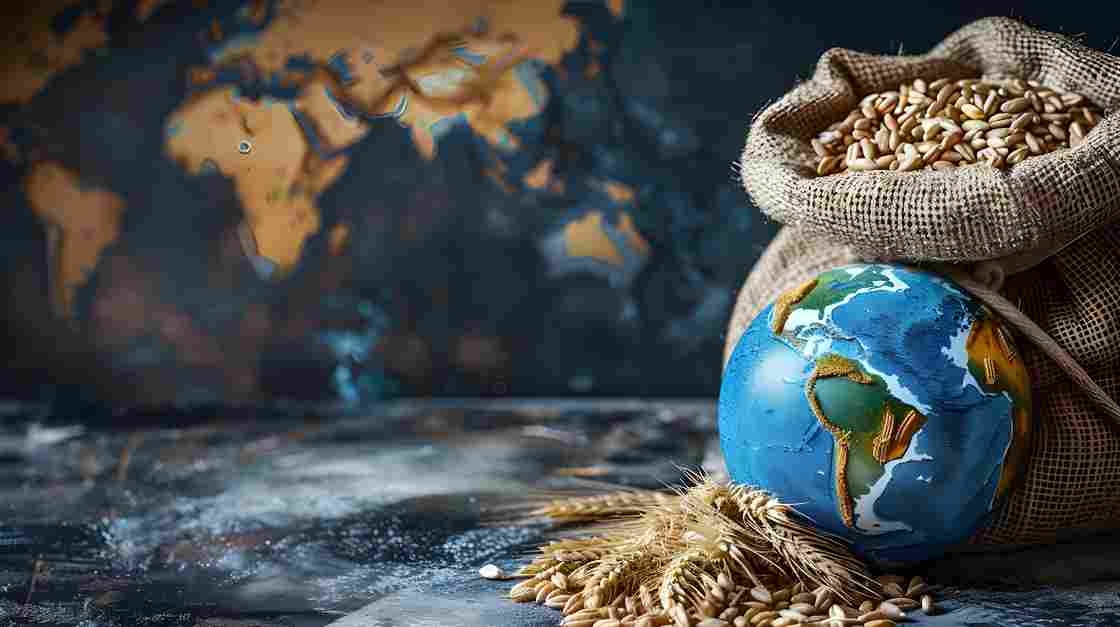Challenges and Opportunities in Global Agricultural Trade
 The impact of globalization on the food system is evident in the relationship between the agricultural sector and global trade. The expansion of the agricultural sector and its ability to meet the growing demands is directly tied to global agricultural trade.
The impact of globalization on the food system is evident in the relationship between the agricultural sector and global trade. The expansion of the agricultural sector and its ability to meet the growing demands is directly tied to global agricultural trade.
Agricultural trade is an important part of the global economy. It has provided employment, improved the standard of living and farm income, increased national revenue, fostered rural development, and most importantly, ensured food security.
Since trade is critical for every nation’s food security, the agricultural trade market is extremely competitive. It is dominated by the wealthy countries of the world. China, the European Union, and the United States are the leading players in global agricultural trade.
These nations are heavily invested in research and infrastructures and strive to embrace technological advancements that are beneficial to the agricultural sector. They produce high-quality goods that boost their competitive stance in the global market.
However, for agricultural commodities, foreign trade is highly subject to a range of factors such as trade policies, limited infrastructures, growing global food demands, climate change, and other events of global uncertainties like the COVID-19 pandemic.
These events negatively impact the global trading of agricultural commodities by disrupting supply chains and affecting prices. However, one thing unique to the agricultural sector is that the opportunities are hidden in the challenges.
To see these opportunities, one must examine the current challenges and proffer comprehensive strategies that can mitigate them.
Challenges in Global Agricultural Trade
-
Trade Restrictions and Policy Regulations
Food is a necessity for everyone, so every country is directly involved in agricultural trade today.
However, the difference in regulatory policies poses a looming threat. Exporters are required to comply with harsh and meticulous trade regulations before they can access the international market. This creates an unstable environment for players in the global marketplace.
-
Socioeconomic Factors
Farmers in developing countries often struggle with limited access to capital and farm inputs, supply chain infrastructures, and adequate technology. Inadequate storage facilities and transportation infrastructures reduce the shelf life of fresh food products which leads to post-harvest losses due to spoilage. This makes it difficult for small-scale farmers to be involved in global trade as their products cannot make it across borders in good condition.
-
Financial Factors
Fluctuating rates, tariffs, and quotas have always had a negative impact on trade regardless of the industry. Price volatility disrupts the flow of commodities in the market. This is quite a formidable challenge to a sensitive sector like agriculture. Farmers that run at complete losses because of the prohibitive cost of production and eventually pull out of the value chain.
-
Geopolitical and Regional Competition
It is undeniable that global trade is directly dependent on both global and regional partnerships. This has a greater percentage of contribution to the challenges faced in agricultural trade. Trade disputes can lead to market uncertainties and disrupt the flow of agricultural goods.
For instance, there was a competitive stance between the two world’s largest economies, the United States and China, towards the end of 2010. A trade dispute ensued between the two economies after China imposed tariffs on US agricultural exports in retaliation for the US tariffs on Chinese exports. Being the destination market for US soybeans, China decided to halt importation from the United States.
This trade war was particularly challenging financially for the US soybean farmers and investors, resulting in a negative spillover effect on the price of other feed crops like almonds. The US almond market was affected greatly, and Australia gained Chinese market share by replacing the US in almond exports during the US-China trade war while Brazil maintained its position as the lead supplier of soybeans to China even after a truce was reached in 2020,
-
Climate Change and Sustainability
Climate change poses a great threat to agricultural trade. The extreme weather events occurring in recent years bring with it a shift in the growing conditions which impacts agricultural productivity and supply chain processes.
Sustainability is a growing environmental concern in agriculture today.
-
Imbalance Between Arable Land and the Growing Demands for Farm Products
An imbalance between the natural resources and the growing appetite of the world population is a great challenge to agricultural trade. A large amount of arable land is needed for crop production and animal production to meet the global food demands, and it is a limited resource. Meanwhile, urbanization has practically reduced the availability of arable land. This causes food scarcity, resulting in limited flow of food commodities for international trade.
Strategies to Mitigate the Barriers in Global Agricultural Trade
 In order to navigate the challenges faced in global agriculture trade, countries need to collaborate and establish clear plans that can foster growth opportunities in the sector.
In order to navigate the challenges faced in global agriculture trade, countries need to collaborate and establish clear plans that can foster growth opportunities in the sector.
Here are some strategies that could be employed to mitigate trade challenges encountered in agriculture.
-
Trade Agreements
Trade agreements play a significant role in harmonizing the regulatory standards of different entities involved in agricultural trade. It reduces tariffs, eases trade barriers, and unlocks opportunities for market access and expansion, which helps to create a stable and predictable environment for trade.
A good example is the European Union Agricultural Policy and free trade agreements that were created to facilitate a deeper economic integration, trade liberalization, and market access for agricultural products among member and partner countries.
-
Sustainable Practices and Ethical Consideration
This is an important strategy to solve environmental concerns. Producers in the agricultural value chain should be encouraged to adopt sustainable practices, invest in renewable energy, and engage in ethical labor standards.
There is a high consumer demand for environmentally responsible produced food products. So, adherence to sustainable standards with trackable labels and certifications can be a competitive advantage in the international market, opening doors to premium pricing and a large customer base.
-
Improved Global Supply Chain
The global supply chain is simply the network of organizations, people, information, resources, and activities involved in the food production process including the handling and distribution to the end consumers. It is a whole complex network.
An increased investment in the global supply chain will help reduce the complexity and provide more economic growth.
-
Value Addition and Product Variety
This involves transforming products to improve their market value and increase shelf life. Value addition also brings about product variety that meets the growing demands of customers with diverse preferences.
Opportunities in Agricultural Trade
Despite the challenges, global agricultural trade presents a number of opportunities for all those in the value chain.
-
Production Expansion
The value of global agricultural trade has grown exponentially over the last three decades. This growth is evident in the crop sectors as the expanding global population, with diverse cultural backgrounds and dietary habits, brings significantly increased demand of food products, leading to expanded market access and diversification across borders.
This increase in trade activity has brought about additional gain to farmers and increased returns to investors including all the players in agribusiness worldwide.
-
Strategic Partnerships
Strategic partnership increases the chances of success in foreign trade. Establishing alliances and partnerships is a way to combine the strengths of the public and private sectors to foster economic progress and successful foreign trade.
-
Niche Marketing
Niche marketing is all about offering products and services to a defined target market. The idea of niche marketing is a game changer in agricultural trade. Farmers can now supply goods to consumers whose needs are not really met in the mainstream market. It is a great form of diversification and a means of achieving success in all economic situations.
-
Technological Advancements
In our world today, technological advancement has completely bypassed traditional methods of agricultural production. These innovations have contributed to the sector through precision farming, advanced irrigation systems, and genetic engineering that enhance yield to meet the demands of the growing global population.
Interestingly, technological advancement in agriculture has also streamlined foreign trade processes through the provision of digital agricultural hubs and e-commerce platforms that expand market reach and facilitate direct trade between producers and consumers.
Future Trends in Agricultural Trade
Looking ahead, the international trade of food commodities is projected to be shaped by product variety, value addition, shifting dietary trends, growing population, and the rising demand for high-quality sustainable food.
It is anticipated that international agricultural trade will grow exponentially due to diversification, sustainable practices, and technological breakthroughs, providing opportunities for farmers, consumers, and companies.
There will be unrestrained adoption of innovations such as market intelligence which help farmers to make informed decisions about what crops to grow and the target markets. New technologies for improved seeds, value addition, and quality control of farm commodities will be adopted to increase countries’ competitive stance in the global market.
Conclusion
While there are obstacles that threaten the success of agricultural trade, there are also opportunities that could be developed. Instead of hinging on these challenges, nations can capitalize on the possibilities to enhance their share of the agricultural global market and boost their economy.
